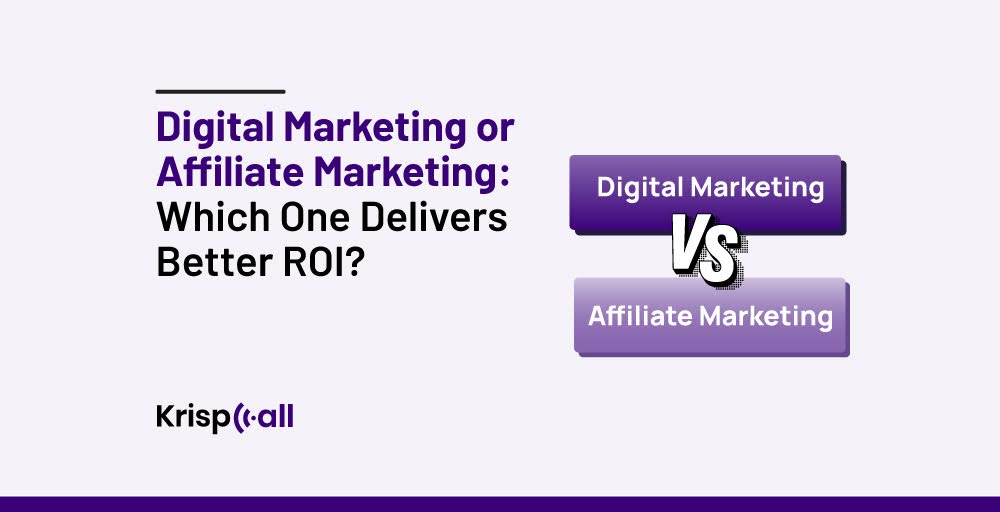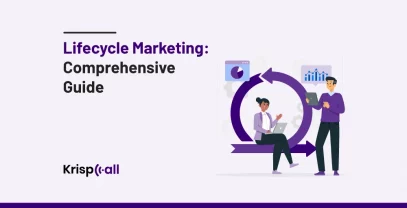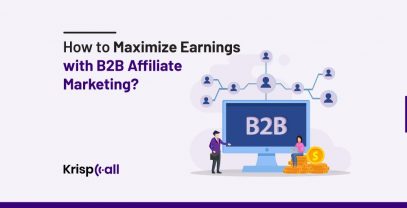In today’s digital world, customer acquisition and retention are challenging😮💨, especially when a business includes an online platform. However, digital marketing and affiliate marketing make customer engagement easy online by utilizing the expansive opportunities of the Internet.
Likewise, Digital marketing uses digital channels to promote and sell products, while affiliate marketing works by partnering🤝 with other businesses.
But how do businesses make sure that their marketing efforts pay off?🤔 Well, Understanding Return on Investment (ROI) is the key to turning marketing activities into profitable ventures.
In this blog, let’s dive deep into digital and affiliate marketing and explore why ROI is crucial for success and which is better for you.
🔐KEY HIGHLIGHTS:
- Digital and affiliate marketing strategies utilize the Internet to enhance customer engagement by promoting their services and products.
- Return on Investment is the key element for any business to thrive.
- The key digital marketing strategies are search engine optimization, email marketing, pay-per-click advertising, and social media marketing.
- Affiliate marketing involves key strategies such as social media influencers, loyalty and cashback programs, affiliate websites, and blogs.
Overview Of Digital Marketing
Digital marketing is considered one of the best online marketing strategies and techniques. It involves using different digital channels to promote and sell products and services. With digital marketing strategies, businesses can easily reach their target audience in the digital realm.

Moreover, Digital marketing uses online platforms to connect with customers through targeted campaigns, including websites, social media, search engines, and mobile apps. Similarly, it makes customer engagement fruitful by using strategies like SEO and social media marketing.
Key Components And Strategies
Digital marketing includes several key components and strategies that help reach large and targeted audiences. Some of the key components and strategies are:
- Search Engine Optimization (SEO): This technique optimizes websites and content to rank higher in Search Engine Results Pages (SERPs). Therefore, understanding SEO concepts like keyword research, meta tags, content quality, and backlinks is important.
- Email marketing: Email marketing helps businesses connect directly with targeted customers via email. Similarly, it is one of the digital marketing channels with the highest ROI. This strategy uses personalized content, segments its audience, and tracks metrics for its effectiveness.
- Pay-per-click (PPC) advertising: PPC advertisements refer to any paid digital approach on various digital channels. They include Facebook, LinkedIn, SEO, and Google ads, where advertisers pay search engines a fee each time someone clicks on their ad.
- Social media marketing: Social media marketing involves marketing through several platforms, such as Instagram, Facebook, Twitter, and TikTok. It works by posting regular content on social media platforms and engaging with followers. It also involves paid advertisement to reach the target audience.
- Content marketing: Content marketing focuses on creating content that fascinates the audience and increases traffic. The content should be rich in quality and engage a defined audience. It can be done through blog posts, articles, podcasts and eBooks.
Pros And Cons
Various advantages and disadvantages of digital marketing are:
Pros:
- Improves brand loyalty.
- Measure and track results.
- Get quick feedback.
- Enhances customer engagement.
- Global reach
Cons:
- Competition is high.
- Dependent on technical experts.
- Maintenance costs are high.
- Security and privacy issues may arise.
- Vulnerable to malicious activities.
Overview Of Affiliate Marketing
Affiliate marketing is performance-based marketing in which businesses affiliate with third parties like entrepreneurs, influencers, and bloggers to promote their services and products. Likewise, third parties promote using websites, email, or social media platforms and earn a commission through business.
Furthermore, affiliate marketing is a marketing strategy that quickly catches the audience’s interest. Affiliates also work hard to market the products, as their earnings are directly tied to the reach of the targeted audiences.
Key Components And Strategies
Affiliate marketing is the unique strategy for making affiliates work and drive traffic through promoting brands and services. Here are the key components and strategies of affiliate marketing:
- Affiliate websites and blogs: Web-based platforms considered affiliate marketing include websites and blogs that post content like product reviews. Similarly, these platforms ensure they drive the right traffic via SEO and create relevant content.
- Social media influencers: Influencers introduce products to their followers and potential consumers through social media like Instagram, YouTube, etc. Influencer marketing means using the popularity and the audience’s trust to encourage them to participate in affiliate programs and promote relevant products within the framework.
- Coupon and deal sites: Coupon and deal sites gain popularity among users searching for promotions and individual offers. The affiliates get to share coupons and other sale promos, which drive visitors to buy products while paying a commission on every clicked link.
- Loyalty and cashback program: Some loyalty and cashback programs seek to convert the purchase amount into points or cash. Hence, customers are offered bonuses to come shopping, and for every sale that an affiliate brings to the site, the affiliate gets a cut.
For instance, one of the highest-paying Affiliate Marketing is the KrispCall affiliate program: It offers a generous 30% lifetime recurring commission for promoting its cloud telephony solution. With a 90-day cookie duration and transparent reporting, affiliates can earn substantial income by referring KrispCall to their audience.
Pros And Cons Of Affiliate Marketing
Here are some advantages and disadvantages of affiliate marketing:
Pros:
- Minimal/Zero investment.
- No experts are needed.
- Low investment cost.
- Billion-dollar business.
- Convenient and flexible.
Cons:
- Dependent on platforms.
- It needs patience and hard work.
- No control over the competition.
- Quantity approach.
Comparing Roi: Digital Marketing Vs Affiliate Marketing
Digital marketing and Affiliate marketing both deliver high ROI when executed effectively. Here is a case study of digital marketing and affiliate marketing with examples to help you understand these marketing strategies more clearly and precisely.
Digital Marketing: Case Study
To increase sales, a retail company invests in and promotes its products through advertisement, especially through social media and e-mail marketing. It uses ROI as its key metric by analyzing the revenue from these channels compared to the costs invested.
For example, company A spends £10,000 on social media ads and email campaigns. The social media ads generate £30,000 in sales with 200% ROI. Similarly, the email campaigns generate £20,000 with a 100% ROI.
Affiliate Marketing: Case Study
An online software service partners with affiliates who advertise for its subscription-based services. Furthermore, an affiliate receives compensation for every sale made by the site.
For instance, company B usually pays its affiliates up to 25% of the total sales of the products they promote. £5000 is spent on affiliate commissions, while the affiliates contribute to £ 50,000 of subscription sales with an impressive 900% ROI.
Factors Influencing ROI
The factors affecting ROI based on digital marketing and affiliate marketing are:
Digital Marketing
- Targeting and Audience Segmentation: Targeting and audience segmentation ensure the marketing strategies successfully reach the right audience. In other cases, this factor shows reasonable conversion rates and enhances the ROI.
- Channel Effectiveness: Different channels, such as Search Engine Optimization and Pay-Per-Click, vary in cost and efficiency. However, mixing these channels can increase effectiveness and enhance ROI.
- Content Quality and Engagement: If the online content is well-researched, relevant, and interesting to the target market, it can perform much better. Content-rich in quality attracts more customers and generates a higher number of conversions.
- Conversion Optimization: Enhancing the landing pages and users’ experiences increases conversion rates, achieving optimum returns on investments.
Affiliate Marketing
- Commission Structure: The rate of commission and the kind of commissions given to affiliates impact overall profitability. Probably, impacting the profit of the marketing strategy leads to impacting the return on investment as well.
- Affiliate Selection: Affiliate traffic typically originates from internet users interested in the products offered online. So, selecting the right affiliates increases sales and return on investment.
- Tracking and Attribution: Proper affiliate sales tracking ensures that the sale pixels are accurately recorded and assigns traffic to the correct affiliates. This means that everyone is paid fairly, thereby helping improve the ROI.
- Long-term Value (LTV): Influencing the variable of customer lifetime value while receiving customers from affiliate programs can be another way of enhancing ROI through affiliate marketing.
You may be interested in🧐: How does VoIP help skyrocket your business ROI?
Which One Should You Choose?
When choosing between digital marketing and affiliate marketing, many factors must be considered. However, the choice will generally depend solely on priorities and the necessity for your business.
Digital marketing provides control and flexibility, with the ability to directly modify its campaigns to succeed at branding with social media, search engine marketing, and content media. It is particularly suitable for PPC marketing, which drives traffic and sales instantly.
Nevertheless, affiliate marketing costs less money to begin with because you only pay for sales or leads. It is popular among affiliates because it allows them to take advantage of their audiences, providing an extended reach.
Furthermore, affiliate marketing would be the better choice if you are starting a new business. It reduces costs and expands the reach in the shortest time possible using startup capital. Using this strategy, you don’t have to invest more budget while starting a new company or business.
Moreover, when the business grows after using affiliate marketing strategies, the business owner can reinvest in digital marketing to create brand recognition and market directly to an audience.
Conclusion
In terms of ROI, it is impossible to compare the brilliance of digital marketing with the versatility of affiliate marketing. However, both digital and affiliate marketing tend to provide users with relatively high rates of return.
Likewise, You can choose these strategies depending on your objectives, overall plans, and activities. To achieve the best results ever and stand firm in this market, implement both and rule your market by achieving better results with a higher ROI on your investment.





